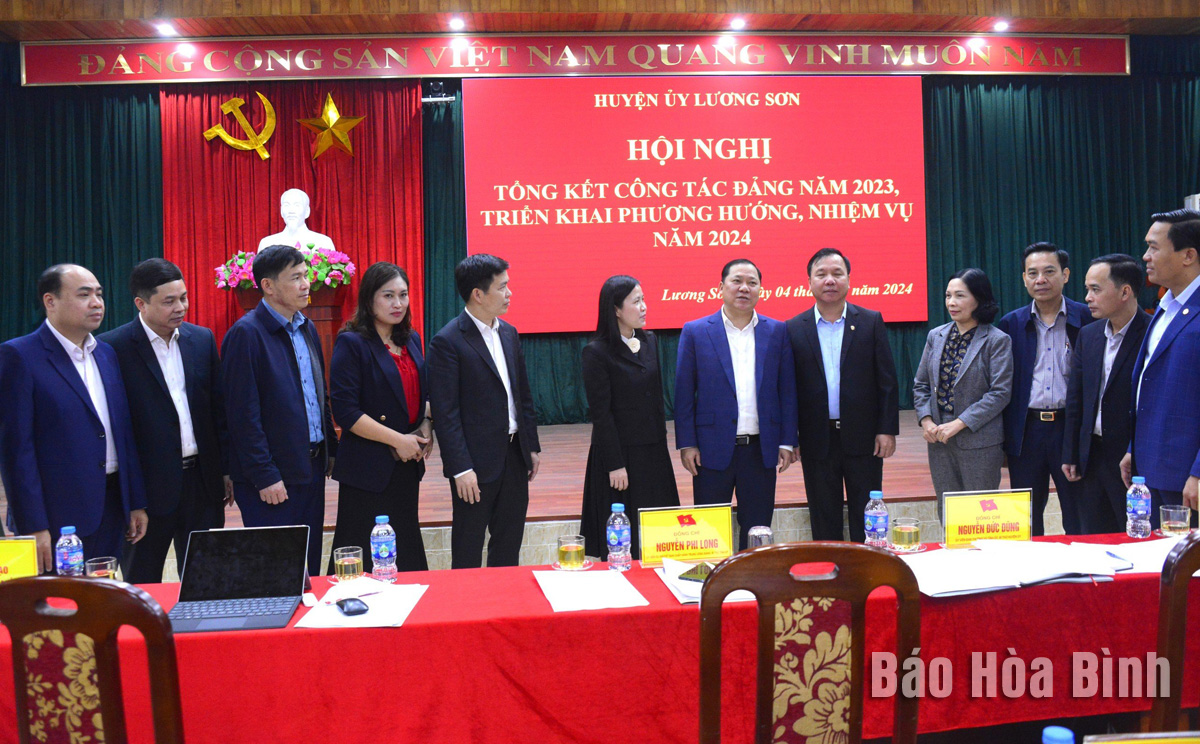
Nguyen Phi Long, Secretary of the Party Committee of Hoa Binh province, attended a meeting of Luong Son district’s Party organisation on January 4, which reviewed Party affairs in 2023 and set out tasks for this year.
Nguyen Phi Long, Secretary of the provincial Party Committee, and other
officials at the meeting.
Last year, under the leadership of the Party organisation, Luong Son maintained
its role and position as an economic engine of Hoa Binh province, according to
a report delivered at the meeting.
The locality fulfilled up to 14 out of the 15 targets assigned by the Party
organisation, with State budget collection reaching 930 billion VND (38.15
million USD), surpassing the estimate by 158.33%, and up 59.6% year-on-year. As of the end of 2023, its urbanisation rate was estimated at 52.2%, up 3.3%
year-on-year.
However, limitations still remain in the fields of inspection, land, natural
resources and environmental management, and site clearance for some products,
the report said.
In his
remarks, Long asked the Party organisation to step up instructions in order to
satisfy criteria set for a 4th-tier urban area in 2024, striving to achieve the
township status in 2025. In the economic sphere, he urged Luong Son to focus on land clearance for major
key projects of the province and the district, create optimal conditions for
investors to soon begin a number of major projects, and intensify inspections
over the management and use of natural resources. Besides, the district needs to further preserve and uphold cultural traits of
ethnic groups, and promote its
image, he said.
On this occasion, the Party organisation honoured collectives and individuals
for their outstanding performance in fulfilling political tasks in 2023.
Hoa Binh province is undergoing a dynamic transformation amid Vietnam’s national digital transition. Building on Poliburo’s Resolution No. 57-NQ/TW on breakthroughs in science, technology, innovation, and national digital transformation, the province has rolled out a wide range of practical action plans. A standout initiative is the "Digital Literacy for All” movement, an effort to ensure that no one is left behind in the digital era.
Hoa Binh province is undergoing a dynamic transformation in the wake of the national digital transformation movement. Building on Resolution No. 57-NQ/TW of the Politburo on breakthroughs in science, technology, innovation, and national digital transformation, the province has implemented a wide range of practical action plans. A standout initiative is the "Digital Literacy for All” movement ambitious effort to ensure that no one is left behind in the digital age.
With a spirit of unity and proactive problem-solving, the Party Committee, the government and the people of Dong Lai Commune (Tan Lac District) have made great strides in implementing the resolutions of the 24th Party Congress of the commune for the 2020 - 2025 term. Focusing on leadership and practical actions, the commune has brought the Party’s resolutions into daily life, creating strong impacts and pushing the local development forward.
Amid the nationwide push for digital transformation, young people in Hoa Binh Province are stepping up as dynamic pioneers, applying technology to enhance Youth Union operations and expand the reach of youth-led initiatives. Through creativity and adaptability, Youth Union organizations at all levels have introduced a series of practical solutions, contributing to modern governance and community development.
In recent years, An Nghia commune, located in Lac Son district, has stepped up administrative reform, focusing on improving the quality and efficiency of its single-window service unit for receiving and processing administrative procedures. These improvements have helped create favourable conditions for local residents and organisations to handle administrative procedures, contributing to the commune’s broader socio-economic development.
The Prime Minister-approved master plan to develop the multi-use value of forests ecosystems through 2030, with a vision to 2050, aims to improve the management and sustainable use of forest resources, create jobs, increase incomes, and improve the living standards of ethnic minorities, people in mountainous and remote areas, forest workers and those living near forests.



